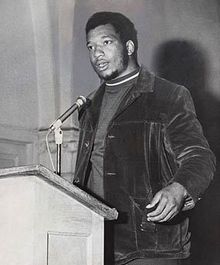A Quote by Noam Chomsky
The literature is like that - they [unions] are constantly talking about the masses, the danger they pose, and how to control them. They understand what they're doing, and they're very class conscious. They press policies which work for their interests.
Related Quotes
The correctness of any of our policies has always to be tested and is always being tested by the masses themselves. We ourselves constantly examine our own decisions and policies. We correct our mistakes whenever we find them. We draw conclusions from all positive and negative experiences and apply those conclusions as widely as possible. In these ways relations between the Communist party and the masses of the people are constantly being improved.
And to me, that is the greatest danger, that people start questioning basic facts and start not understanding the importance of democratic institutions such as the free press. I mean, to call the press the enemy is dangerous and just remarkably bizarre. The press is the only profession protected in the Constitution because of how important the framers viewed the press. But in authoritarian regimes, they control the press. And to me, going down an authoritarian path is the greatest danger that we face as a republic.
We got to face some facts. That the masses are poor, that the masses belong to what you call the lower class, and when I talk about the masses, I'm talking about the white masses, I'm talking about the black masses, and the brown masses, and the yellow masses, too. We've got to face the fact that some people say you fight fire best with fire, but we say you put fire out best with water. We say you don't fight racism with racism. We're gonna fight racism with solidarity. We say you don't fight capitalism with no black capitalism; you fight capitalism with socialism.
It seems that certain transcendental realities emit rays to which the masses are sensitive. That is how, for example, when an event takes place, when at the front an army is in danger, or defeated, or victorious, the rather obscure news which the cultivated man does not quite understand, excite in the masses an emotion which surprises him and in which, once the experts have informed him of the actual military situation, he recognizes the populace's perception of that "aura" surrounding great events and visible for hundreds of kilometers.
The fruits of the economy and all the advantages of technology and globalization have gone far more to the investor class and the professional class and not as much to the working class. Partly because of the loss of labor unions, partly because of things like a lack of antitrust enforcement, policies that have privileged shareholder returns.
If we understand the mechanisms and motives of the group mind, it is now possible to control and regiment the masses according to our will without their knowing it In almost every act of our daily lives, whether in the sphere of politics or business, in our social conduct or our ethical thinking, we are dominated by the relatively small number of persons who understand the mental processes and social patterns of the masses. It is they who pull the wires which control the public mind.
What I do is work for three or four years and then I take a year off, and then I come back again and work for three or four years and then take another year off. It is not about just working and then writing for a year. That is not how it is structured. It is about doing very conscious goal-driven activities for four years and then taking a year off in complete surrender to discover facets of myself that I don't know exist and exploring interests with no commercial value associated with them at all.
Policies are designed to undermine working class organization and the reason is not only the unions fight for workers' rights, but they also have a democratizing effect. These are institutions in which people without power can get together, support one another, learn about the world, try out their ideas, initiate programs, and that is dangerous. That's like a referendum in Greece. It is dangerous to allow that.
Unlike side issues like unemployment, unions, and minimum-wage laws, the subject of work itself is almost entirely absent from libertarian literature. Most of what little there is consists of Randite rantings against parasites, barely distinguishable from the invective inflicted on dissidents by the Soviet press.
One question is: Who is the working class today, and how has it changed? Where are we in that? I don't have a knee-jerk kind of 1930s thing about we must build the unions and that's the way to the future. I'm writing this book right now called Pallin' Around, and the subtitle is: "Talking to the Tea Party." And frankly I find talking to the Tea Party exhilarating, I love it.
Incidentally, part of a photographer’s gift should be with people. You can do some wonderful work if you know how to make people understand what you’re doing and feel all right about it, and you can do terrible work if you put them on the defense, which they all are at the beginning. You’ve got to take them off their defensive attitude and make them participate.




































